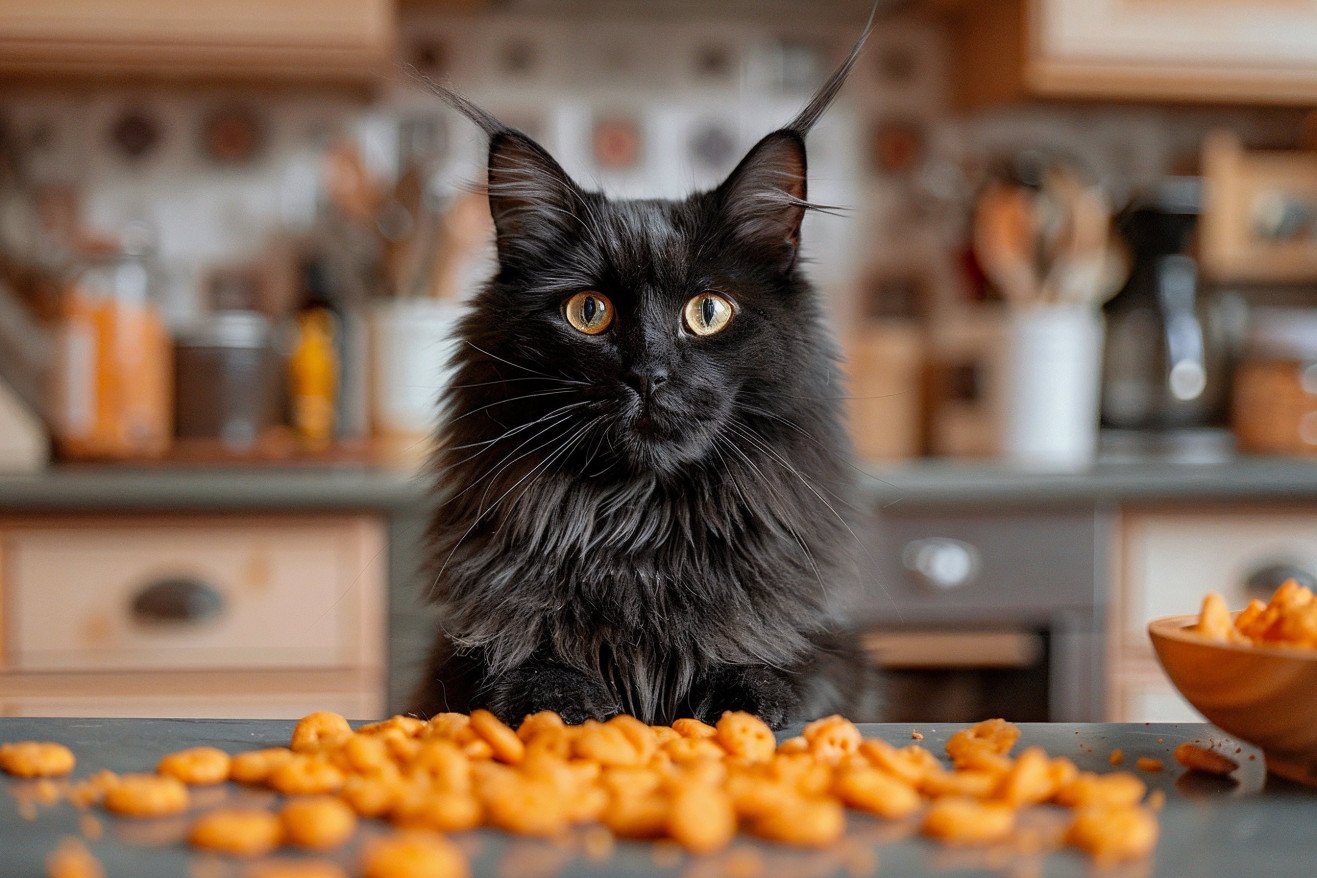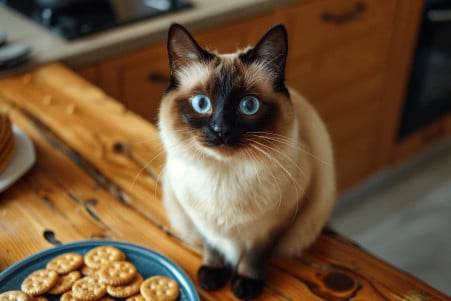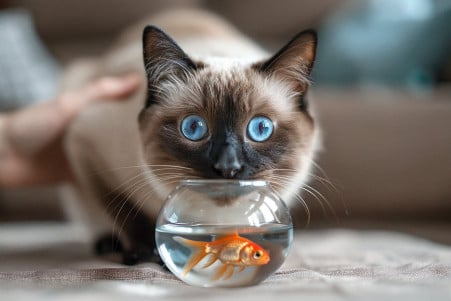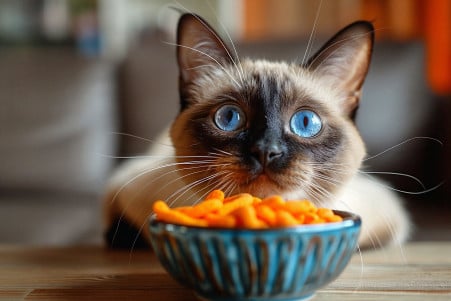Can Cats Have Goldfish Crackers? What Pet Parents Should Know
16 April 2024 • Updated 15 April 2024

Goldfish crackers may seem like a cute snack to share with your cat, but the ingredients and nutritional content of these crackers may make you think twice about giving them to your cat on a regular basis. If you have kids, you may have asked yourself if the popular cheesy crackers shaped like fish can also be a special treat for your cat.
Goldfish crackers are not a good choice for cats. They are low in nutrients and high in things like salt, refined flour, and unhealthy fats that can contribute to obesity, digestive problems, and other health issues in cats if they are a regular part of their diet. Stick to store-bought cat treats or fresh meats that are safe for cats.
To give you a well-rounded view, we'll share the opinions of veterinary nutritionists and findings from scholarly research on pet nutrition and diets. This will help you understand the science behind why certain human snacks like goldfish crackers are not good for cats and what a healthy, species-appropriate diet looks like for cats.
Can cats eat goldfish crackers?
How to Transition Your Cat to a Better Diet
If your cat has become used to eating goldfish or other human foods, it's important to transition them to a more appropriate diet. Sudden changes in a cat's diet can cause stress, food aversion, and digestive upset, so it's best to take a slow, methodical approach, according to veterinarians.
You can start by mixing a small amount of new, high-quality cat kibble or wet food with your cat's current food. Over the course of 7-10 days, increase the amount of new food and decrease the amount of old food, giving your cat time to get used to the change. According to PetMD, it's best to try to match the new food's primary protein sources, guaranteed analysis, and texture to the old food to make the transition easier.
Make sure to keep an eye on your cat's condition, weight, and feces throughout the process to make sure they are tolerating the new food well. You can also use digestive enzymes or rotate between similar foods to help with the transition. With time and attention, you can help your cat get off of human junk food and onto a balanced, species-appropriate diet that will help them thrive.
Potential Dangers of Feeding Goldfish Crackers to Cats
Although a few goldfish crackers are unlikely to cause immediate problems, regularly feeding them to cats can result in a number of health concerns. As Hepper explains, goldfish crackers contain a small amount of onion powder, which is toxic to cats and can cause damage to their red blood cells, leading to anemia. Meanwhile, the Catster article points out that the high sodium levels in goldfish crackers can lead to dehydration, kidney issues, and other health problems in cats.
In addition to these issues, the refined carbohydrates and unhealthy fats in goldfish crackers can cause obesity, diabetes, and other weight-related problems in cats, according to Dr. Souman. Cats can also develop allergies to the ingredients in processed snacks like goldfish crackers, which can cause symptoms like vomiting, diarrhea, and skin problems.
Because of these potential dangers, it's best to avoid regularly feeding goldfish crackers to cats and instead focus on feeding them a well-rounded, species-appropriate diet that will help them stay healthy and thrive.
Knowing What Cats Need to Eat
Cats are obligate carnivores, which means that they need certain nutrients that are only found in animal proteins and fats. Pawlicy Advisor notes that a cat's diet should be made up mainly of animal proteins, including chicken, turkey, fish, and meat byproducts. Cats have a low tolerance for carbohydrates and plant-based materials, like those found in goldfish crackers.
Cats need taurine, arginine, vitamin A, and certain fatty acids, all of which are most easily found in animal products. Preventive Vet explains that not getting these nutrients can lead to a variety of problems, including nutrient deficiencies, obesity, and digestive issues. Making sure that a cat's diet is balanced and species-appropriate is important for keeping them healthy.
Healthy Cat Treat Options
Instead of giving cats human snacks like goldfish crackers, it's better to give them commercial cat treats or homemade treats that are made with ingredients that are safe for cats. Per BeChewy, some healthy treat options for cats are cooked, unseasoned chicken or fish, eggs, and pureed vegetables like pumpkin, broccoli, and green beans.
Homemade treats can also be a more affordable and healthier option to store-bought treats, and many recipes are made with simple ingredients like salmon, tuna, and whole grains. It's also important to gradually introduce new treats or foods and watch for signs of digestive upset or allergies. Like with any treat, it's important to give them in moderation, and treats should be no more than 10% of a cat's daily caloric intake, according to SplootVets.
More Human Foods That Cats Should Not Eat
In addition to goldfish crackers, there are several other human foods that can be toxic or harmful to cats and should be avoided. Pawlicy Advisor lists onions, garlic, chocolate, grapes, raisins, and xylitol as examples of human foods that can be toxic to cats and cause serious health problems or death.
RAWZ also points out that raw meat, fish, and eggs can contain bacteria that can make cats sick, and dairy products can cause digestive issues because cats are lactose intolerant. In addition, Preventive Vet explains that salty, fatty, or sugary human foods can lead to obesity, pancreatitis, and other health issues in cats.
Because of these potential dangers, it's important to talk to a vet before giving a cat any human food to make sure it's safe and healthy. Feeding cats a balanced, species-appropriate diet is important for their health and well-being.
Conclusion: Make Sure You're Prioritizing Your Cat's Health and Well-being
While goldfish crackers may seem like a fun and harmless snack for cats, they lack essential nutrients and contain ingredients that can potentially harm a cat's health. Cats are obligate carnivores with specific nutritional needs that can only be met through a diet rich in animal-based proteins and fats. Regularly feeding human snacks like goldfish crackers to cats can lead to obesity, digestive issues, nutrient deficiencies, and other health problems.
To ensure your cat's well-being, it's best to provide them with a balanced, species-appropriate diet and occasional cat-safe treats or homemade options. Consulting with a veterinarian can help you make informed decisions about your cat's diet and ensure they receive the proper nutrition for a healthy, happy life.


